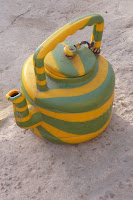‘Good morning teacher, good morning friend’, is how the
pupils of grade 3 at Malhada Lower Basic greet one of the teachers and me. Most
of the classes at this school are doing an end-of-the-semester-test. But grade
3 and 5 have already done the national test, so they have time to invite me
into the classrooms. Grade 3 is especially happy to see me, because their
teacher did not feel well enough to attend school.. And with lack of a ‘teacher
substitute pool’ some of the other teachers walk from their own class to this
grade 3. The pupils are pleased that I will keep them busy the coming hour.
Many clothes
‘When thinking of Holland what do you see?’, I ask. ‘Big
country, forest, European, cold.’ ‘What else?’ One of the pupils raises his hand. ‘Madam
Jessica, I want to add they have many clothes.’ Many clothes? I think of my
closet with winter clothes, summer clothes, clothes for fall and spring. Is
this boy thinking of that? ‘Okay, I write it down. Can you explain yourself a
bit more?’ I ask. ‘They have many clothes. They have many things. They park
many things in containers and ship it.’ I see what he’s getting at, and I
understand where it’s coming from. Also in our house in Bijilo some boxes from
the Netherlands filled with clothes, caps and pens are waiting to be
distributed to people who need it here in The Gambia.
Appriciation
Most Gambians are happy with Dutch people sending materials to
help out. As soon as they find out here I’m Dutch, they respond: ‘Oh you are
from Holland? Allès ggoed? Holland is nice. Hollandisch people are good. They
build schools, give money, send containers with secondhand clothing,
schoolbooks, furniture. That’s ggoed.
Allèmaal ggoed.’ Most Gambians are very grateful for the things done here.
The other day I joined some Dutch couples to a grand happening of a
continuation of a water project. ‘Abarraka - thank you - was one of the
Mandinka words I recognized a lot in the many speeches and in the singing of
the women.’ Driving back with the Dutch couples one of the ladies shows
her concern. ‘It’s good that those projects are here. But will they continue? Sorry
to say, but we are all a bit older. Like many of the other Dutch helping out
here. What if we cannot come here anymore, because we have become too old? Will
younger people take over and play their part in the world?’
Thoughts and actions
Though I’m not sure if I’m still young enough to be part of
the ‘younger people’, I respond: I don’t know. I know money and basic materials
are a necessity and needed for development. I try to play my part and I hope
others will too. But I also see I might do it in a different way. Is it good to ship second hand school banks?
Or is it better to support the local carpenter around the corner to build the
furniture for the school? And what does it do to our thoughts of the other?
What does it say that these children in grade 3 want me to write that Holland
has many cars, big airplanes, many good jobs, banks, beautiful (yes, only
beautiful) people and many clothes?
I don’t know what the opinion of the boy was about the many
things the Dutch send to the
Gambia. No time to ask, because the next thought
about Holland was presented. ‘Rabbits, madam Jessica. They have rabbits.’ ‘And
coconut.’ I write it all down. Let’s see how the correspondence will influence the
actions and thoughts of these children in the Gambia and in the Netherlands.






















